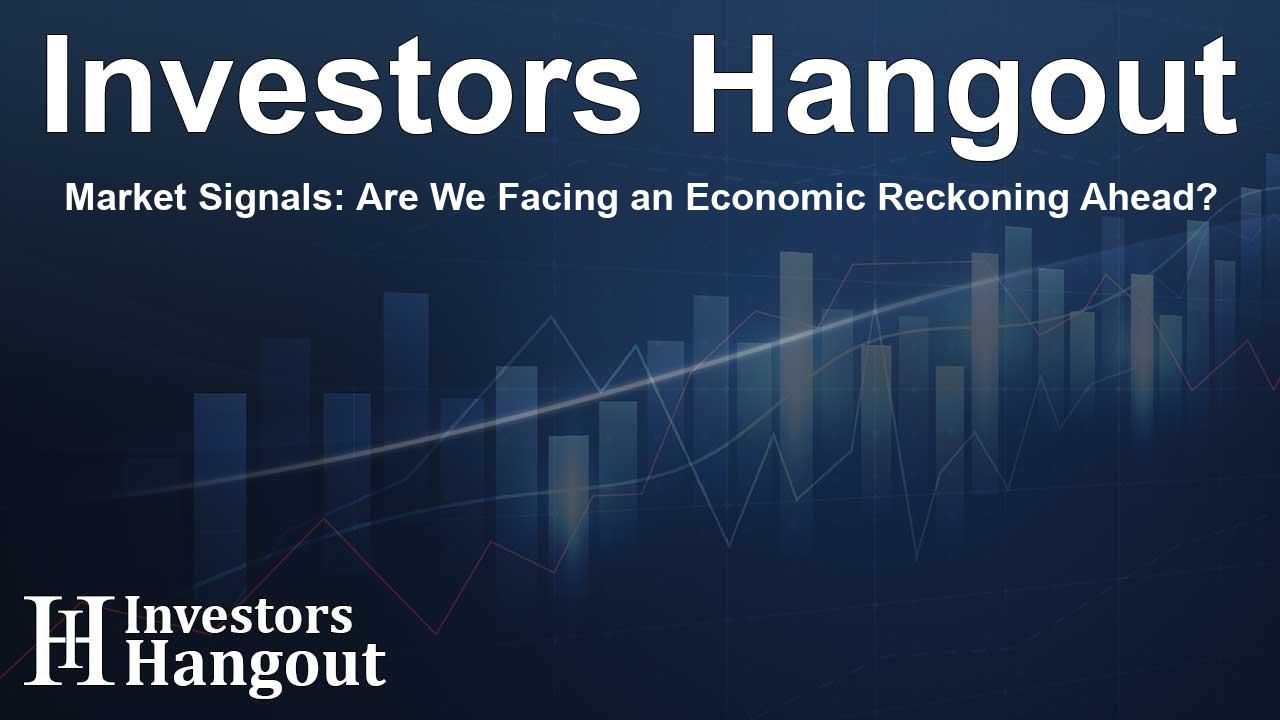Market Signals: Are We Facing an Economic Reckoning Ahead?

Understanding Today's Market Dynamics
In the ever-evolving landscape of Wall Street, signs of a market bubble are becoming starkly evident. The current environment resembles the excesses of the late 1990s, with indices hitting unprecedented highs and valuations soaring to levels that defy logic. Investors are optimistic, dubbing this a 'new era', yet historical indicators urge caution.
Valuation Metrics Indicate Overextension
Notable financial figures like Robert Shiller have raised concerns about current valuations using historical metrics such as the cyclically-adjusted price-to-earnings ratio (CAPE). Shiller's model, which typically averages around 17, currently stands at a startling 39, indicating potential overvaluation that could lead to market corrections.
As we gaze at the Nasdaq, it currently trades above 105% of the U.S. economy's total output. This unprecedented occurrence raises alarms, especially considering Buffett's warning that levels exceeding 140% represent a risky gamble.
Buffett's Cautionary Principles
Warren Buffett's investment philosophy often emphasizes the significance of sustainable valuations. Berkshire Hathaway, known for its prudent approach, now holds a staggering cash reserve, demonstrating caution amid the market frenzy. They opted for strategic purchases, like UnitedHealth, only when significant price drops occur, suggesting their awareness of potential volatility.
A Few Giants Dictating Market Trends
Over the latest five-year horizon, a select group of stocks often referred to as the 'Magnificent Seven' have outperformed the rest of the market. With an average gain of 335%, these stocks dominate the S&P 500, indicating a lack of diversity in market growth. Nvidia, for instance, plays a pivotal role in shifting market performance, highlighting how a few heavyweight stocks can disproportionately influence overall indices.
Market Fragility and Hype
Historical trends support the notion that when a concentrated group drives market performance, broader market weaknesses can emerge. Today's market breadth indicates a historically narrow landscape, with only a handful of stocks contributing to overall gains. Sam Altman, CEO of OpenAI, candidly acknowledged the potential overexcitement surrounding AI investments, echoing sentiments shared by many market analysts.
The Energy Challenge Behind AI Growth
Amid the AI excitement lies a fundamental challenge: dependency on electricity. Recent findings from the Department of Energy reveal that data centers consume a substantial percentage of electricity, with projections suggesting this could rise dramatically in the upcoming years. Virginia, home to many data centers, may soon find itself grappling with energy constraints.
Altman highlighted that OpenAI is poised to invest massively in expanding data center capacities, further emphasizing the pressing necessity for sustainable energy solutions to meet the demands of technological growth.
The Need for Sustainable Power Solutions
As the market optimistically prices AI growth, the critical bottleneck is not merely technological innovation, but the capacity to provide adequate power sources. Without robust investments in renewable energy infrastructures, the long-term vision for AI and tech growth may face severe limitations.
Preparing for Potential Market Corrections
While the market appears robust at the moment, the underlying vulnerabilities indicate that a correction may be on the horizon. As we reflect on historical precedents, significant gains without substantial backing can culminate in sharp downturns.
Altman's remarks poignantly capture the essence of the current atmosphere: while many could stand to gain from these developments, the risks are inherent, and losses may also be steep. The dynamic between innovation and valuation remains delicate, teasing the edge of economic change.
Frequently Asked Questions
What is CAPE and why is it important?
CAPE, or cyclically-adjusted price-to-earnings ratio, is a valuable metric developed by Robert Shiller to assess stock market valuations over a long-term period, smoothing out fluctuations caused by economic cycles.
What do historical trends indicate about current valuations?
Historically, when CAPE values exceed 37, subsequent years show negative returns for the S&P 500, suggesting caution among investors when present valuations exceed historical averages.
How are concentrated stocks impacting the overall market?
A few dominant stocks contribute disproportionately to market gains, leading to a precarious situation where broader market resilience may suffer if those stocks falter.
Why is energy consumption a concern for tech growth?
As demand for AI and data center services skyrockets, electricity consumption may outpace supply, creating challenges for continued growth unless sustainable energy practices are adopted.
What should investors be aware of moving forward?
Investors should recognize the potential for market corrections due to overvaluation, concentrated stock performance, and increasing energy demands, balancing enthusiasm with strategic caution.
About The Author
Contact Caleb Price privately here. Or send an email with ATTN: Caleb Price as the subject to contact@investorshangout.com.
About Investors Hangout
Investors Hangout is a leading online stock forum for financial discussion and learning, offering a wide range of free tools and resources. It draws in traders of all levels, who exchange market knowledge, investigate trading tactics, and keep an eye on industry developments in real time. Featuring financial articles, stock message boards, quotes, charts, company profiles, and live news updates. Through cooperative learning and a wealth of informational resources, it helps users from novices creating their first portfolios to experts honing their techniques. Join Investors Hangout today: https://investorshangout.com/
The content of this article is based on factual, publicly available information and does not represent legal, financial, or investment advice. Investors Hangout does not offer financial advice, and the author is not a licensed financial advisor. Consult a qualified advisor before making any financial or investment decisions based on this article. This article should not be considered advice to purchase, sell, or hold any securities or other investments. If any of the material provided here is inaccurate, please contact us for corrections.
